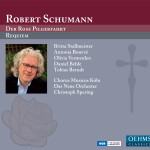 É de se lamentar que este oratório de Schumann tenha tão poucas gravações disponíveis. E esta inspirada leitura de Christoph Spering é com certeza uma das melhores já realizadas, apesar dos músicos envolvidos serem pouco conhecidos.
É de se lamentar que este oratório de Schumann tenha tão poucas gravações disponíveis. E esta inspirada leitura de Christoph Spering é com certeza uma das melhores já realizadas, apesar dos músicos envolvidos serem pouco conhecidos.
Eis a descrição da obra, de acordo com o texto do libreto. A falta de tempo me impede de traduzir para os senhores:
“In 1850 Robert Schumann was enthusiastically received by the Düsseldorf public as the successor to the municipal music director Ferdinand Hiller. It was expected that he would write and perform works of his own for choral and orchestral concerts, both in the sacred and secular areas.
These expectations accommodated Schumann’s commitment to both oratorio and church music during this phase of his life. Important oratorio and ecclesiastic compositions such as Der Rose Pilgerfahrt, Op. 112 (1851), the Missa sacra, Op. 147 and the Requiem, Op. 148 (both 1852) were composed during these years. These works have today disappeared both from the areas of church music and music for the concert hall, although they were originally decidedly intended for these venues.
Der Rose Pilgerfahrt, Op. 112 With Das Paradies und die Peri (Paradise and the Peri, 1843) and Der Rose Pilgerfahrt (1851), Schumann created two secular, fairytale-like oratorios which attained special significance in the context of his vocal-symphonic oeuvre. The composer himself put together the story line to Der Rose Pilgerfahrt from the following draft version: The elf “Rosa” requests from the elf queen to be sent to an earthly life. Insistent warnings cannot prevent her from gaining painful experiences in the world of human beings. As a miller’s daughter, however, she experiences the joys of human existence, culminating in love, marriage and motherhood.
Following her death in the childbed, she enters heaven as an angel. After receiving this extensive poem, Schumann must have been utterly fascinated with it when he started the composition. The examining magistrate from Chemnitz, Heinrich Moritz Horn, sent him his poem on 27 March 1851, probably in hopes of a composition. Schumann
replies to Horn only a month later (21 April 1851), however, with gratitude and questions concerning changes in the text for compositional reasons – by this time, most of the composition had probably long been completed. “The poem is certainly suitable for music, and a good number of melodies have already been going through my mind, but it would have to be much shortened and a great deal made much more dramatic. But this only has to do with the musical composition; far be it from me to take issue with it as a poem.” The poet complies with all of Schumann’s wishes regarding additions and new poetry, and presents the composer with many alterations up to the completely transformed end of the poem. To this, Schumann suggests: “How would it be if we had a choir of angels raised up after Rosa’s death: Rosa would not be transformed into a rose, but into an angel […]. The intensification: rose, girl, angel, seems to me poetic and, moreover, to hint at that teaching of higher transformations of beings to which we all, indeed, wish to adhere” (letter of Schumann to Horn of 9 June 1851).
The original version was never thought for being performed in a concert hall but as a kind of chamber oratorio with piano accompaniment within the family circle. Completed on 11 May 1851, Der Rose Pilgerfahrt was given its first performance on 6 July 1851 by a Singkränzchen” (singing party) in the Schumanns’ Düsseldorf flat, at which “next to Frau Schumann, who played the piano accompaniment with a wonderful poetic feeling, […] Schumann [sat] in blissful dreams and conducted” (from a tenor’s report).
Schumann did not have much enthusiasm for orchestrating the work, even though he completed this task within two weeks at the intensive urging of friends (7–27 November 1851; world premiere of the orchestral version on 5 February 1852 in Düsseldorf). The Schumann biographer Wilhelm von Wasielewski especially sees the value of the orchestration in the fact that it could “significantly increase the appeal of coloration […]“. The interpretation with historical instruments lends multiple support to this quality, above all in the possibility of instrumental timbres. Thus a “mood painting”, made up of colours indicating various frames of mind, was created out of this chamber
oratorio, following an extremely sensitive quality of composing in its sequence of genre scenes (funeral song, elves’ and hunters’ chorus, prayer, wedding dance, choir of angels). The simplicity of the text is interpreted by highly skilful orchestral writing, revealing the most modern techniques in the areas of declamation, rhythm and metre, harmony and the orchestra itself.”
O CD ainda traz um Requiem, op 48, para mim totalmente desconhecido até o momento em que adquiri este CD.
CD 1
1 -24 – Der Rose Pilgerfahrt
CD 2
01 – Requiem, Op. 148 – Requiem
02 – Requiem, Op. 148 – Te decet hymnus
03 – Requiem, Op. 148 – Dies irae
04 – Requiem, Op. 148 – Liber scriptus
05 – Requiem, Op. 148 – Qui Mariam
06 – Requiem, Op. 148 – Domine Jesu
07 – Requiem, Op. 148 – Hostias
08 – Requiem, Op. 148 – Sanctus
Britta Stallmeister, Sopran (Rosa)
Antonia Bourvé, Sopran
Olivia Vermeulen, Mezzosopran (Elfenfürstin, Marthe, Müllerin)
Daniel Behle, Tenor [Erzähler] (Max)
Tobias Berndt, Bariton (Totengräber, Müller)
Chorus Musicus Köln · Das Neue Orchester
Christoph Spering, Dirigent
[restaurado por Vassily em 17/6/2020]